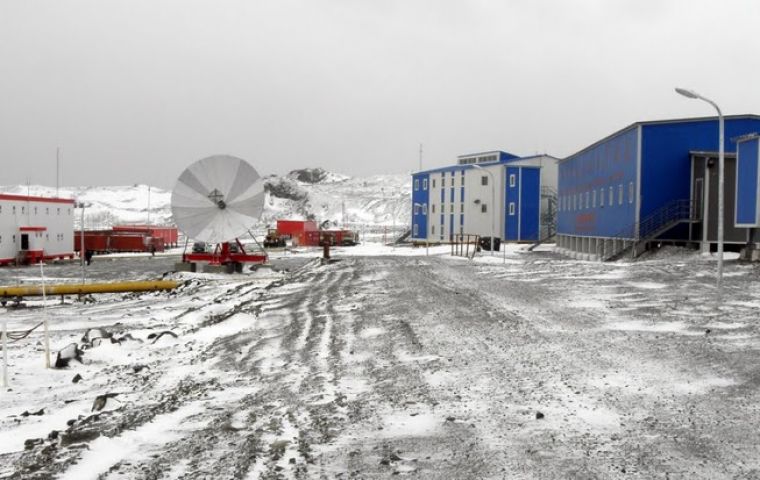MercoPress. South Atlantic News Agency
China starts to build its fourth Antarctica base: more planned
 “Great Wall” on Antarctica’s King George Island, China's fist Antarctica base
“Great Wall” on Antarctica’s King George Island, China's fist Antarctica base Just days after the Chinese rover Jade Rabbit settled down on the moon, China is setting out to bolster its presence in another remote place: Antarctica. Chinese state media said on Thursday that construction workers are en route to the future site of China’s fourth Antarctic research station, after a pit stop at one of its other bases.
The new station will be a hub for climate change science – as well as a possible linchpin in China’s effort to ensure for itself a voice in future negotiations about Antarctica’s valuable natural resources, analysts say.
China is a relative latecomer to the coldest continent. It did not put its first base, called Great Wall, on Antarctica’s King George Island until 1985. The US, Russia, Argentina, and the UK had maintained multiple bases there for decades.
But China has since been investing in the continent with a speed not unlike the quickness with which it has sought to match Russia and the US’s accomplishments in the cosmos. Its second Antarctic base, Zhongshan Station, was put on East Antarctica’s Larsemann Hills in 1989, and it added a third base, Kunlun – the state’s first inland station – atop East Antarctica’s hard-to-reach Dome A in 2009. China’s Polar Research Institute has been on something of a hiring spree, advertising some 47 new positions in 2012.
“As a latecomer to Antarctic scientific research, China is catching up,” Qu Tanzhou, director of the State Oceanic Administration's Chinese Arctic and Antarctic Administration, told Xinhua, China’s state news agency.
Antarctica is known as a “global common,” in that no one state owns it. The Antarctic Treaty, signed by twelve countries in December 1959, and by China in 1983 (cold war politics delayed China's participation), prohibits countries from claiming “any rights of sovereignty” on the continent, which is thought to be brimful with coal, oil, and various minerals including iron and copper. Under the Protocol on Environmental Protection to the Antarctic Treaty, signed in 1991, all mining is prohibited in Antarctica. Just about all that countries are allowed to do there is science.
But the protocol agreement is up for renegotiation in 2048. That has meant that states with prospective interests in the resource-rich region have sought to guarantee a voice in future negotiations by ensuring that they have a literal investment there: a scientific base, the bargaining chip of a region where science is supreme.
“The new base will consolidate China's presence in East Antarctica,” says Anne-Marie Brady, a researcher at the Wilson Center, in Washington DC, who is currently writing a book on China's polar strategy.
“China is playing a long game in Antarctica,” she says, “as are a number of other states such as Korea, India, Russia, who have explicitly stated their interest in Antarctic mineral resources.”
The new station, called Taishan, will be built at East Antarctica’s Princess Elizabeth Land, between the state’s Zhongshan and Kunlan camps. China’s mammoth icebreaker, a bright red ship called The Snow Dragon, had left China for Antarctica last month, bearing the construction materials to put together the new station.




Top Comments
Disclaimer & comment rules-

-

-

Read all commentsI guess Penguins and Seals will be on the menu, in the absence of skinned alive dogs and cats.
Jan 02nd, 2014 - 04:29 pm 0Apparently donkey as well. I read this morning that Walmart China recalled their “canned donkey” meat because it was tainted with fox.
Jan 02nd, 2014 - 04:46 pm 0Are they putting in a takeaway? I hope its not in Queen. Elizabeth land!
Jan 02nd, 2014 - 04:55 pm 0Commenting for this story is now closed.
If you have a Facebook account, become a fan and comment on our Facebook Page!